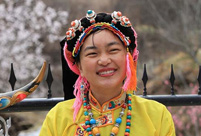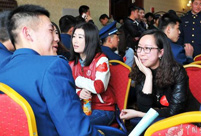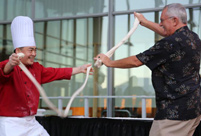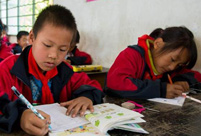 Geng Xuan crowned at 9th China Super Model Contest
Geng Xuan crowned at 9th China Super Model Contest
 Top 10 billionaires in the liquor industry
Top 10 billionaires in the liquor industry
 Ballerinas anywhere but onstage
Ballerinas anywhere but onstage
 Top 10 safest airlines in the world
Top 10 safest airlines in the world
 Top 10 most popular instant messaging apps in the world
Top 10 most popular instant messaging apps in the world
 Inspiring shadow images of Chinese army
Inspiring shadow images of Chinese army
 Models shine Xinjiang auto show
Models shine Xinjiang auto show
 From laid-off worker to int'l referee in bodybuilding
From laid-off worker to int'l referee in bodybuilding
 Selected photos of 'two sessions'
Selected photos of 'two sessions'
 Most unusual taxis around the world
Most unusual taxis around the world
The sound of corks popping can be heard at the Nober-Hans Vineyard nestled in mountains of east China's Shandong Province.
The vineyard is named after German winemakers Nober Gorres and Hans Beu, who were mentioned by Chinese President Xi Jinping during his visit to Germany on Friday, when he talked about people-to-people exchanges between the two countries.
Xi said Gorres and his assistant Beu had made 17 trips to Zaozhuang city in Shandong to share their grape cultivation and grafting technology between 2000 and 2009.
Gorres used to run the family business -- Vineyard Sonnenberg -- a famous Germany winery with more than 500 years of history.
Before he died in May 2009, Gorres would visit Zaozhuang twice a year to help local farmers grow grapes.
The Shanting District of Zaozhuang is a resource-depleting area, after decades of coal mining as a pillar industry. The local authorities seek to transform the economy into more sustainable one, with an endeavor to encourage farmers to grow grape.
But until the arrival of German brewmasters, grape in Shanting were never grown for wine making.
With 91 varieties of European fruit saplings brought over by Gorres and Beu, the vineyard covers about 30 hectares at the foot of Yinshan Mountain. The operation not only teaches Chinese farmers about German wine making, but is also a nursery garden for cultivating European fruit seedlings.
Chinese farmer Yu Tingbo, 70, is in charge of grape cultivation at Nober-Hans Vineyard.
"When Nober first arrived here, he brought two giant bags of saplings. He said the luggage was that heavy he had to pay an overweight luggage fee to get on his flight," said Yu.
The vineyard is now capable of producing 600,000 liters of wine and 200,000 liters of grape juice a year.
Yu said in addition to its own yield, the vineyard also purchases grapes from other farmers' vineyards at protective prices, often 3-5 percent higher than market costs.
The State Administration of Foreign Experts initially invited Gorres, after Zaozhuang city government said it needed a foreign expert to get its winemaking industry off the ground.
With the help of Gorres and Beu, 16 varieties of European grape saplings now grow on Chinese soil.
Marc Linden, grandson of Gorres, said he and his wife Michaela Wolff first visited the vineyard in August 2010.
Linden inherited the family business after his grandfather died. In 2010, he accepted the "Golden Friendship Award", the most honorable award given by the Chinese government to foreigners, in name of his grandfather.
In the wine manor, a two meter-high bronze statue of Gorres with a glass of wine stands by the side of the grape plantation.
"Many rural families now have better living conditions through developing viniculture based on my grandfather's work. I am obliged to keep things as they are," Linden told Xinhua via email.
Linden said he would share his vision and experience in planning, company organization, marketing, product design, purchasing and sales in future.
 Wonderful moment of China's airborne forces
Wonderful moment of China's airborne forces Bai Baihe shoots for fashion magazine
Bai Baihe shoots for fashion magazine Red terraced fields in Dongchuan of Yunnan
Red terraced fields in Dongchuan of Yunnan Jiaju Tibetan Village
Jiaju Tibetan Village Spring dating
Spring dating Confucius institute at UC Davis
Confucius institute at UC Davis Little painted faces at temple fair
Little painted faces at temple fair Top 10 safest airlines in the world
Top 10 safest airlines in the world Foreign students at China-Myanmar border
Foreign students at China-Myanmar border Ballerinas anywhere but onstage
Ballerinas anywhere but onstage Most unusual taxis around the world
Most unusual taxis around the world Micro-expression at 'two sessions'
Micro-expression at 'two sessions' Bridge Worship Festival in Taijiang, SW China
Bridge Worship Festival in Taijiang, SW China Hollywood documentary brings Diaoyu Islands truth to new audience
Hollywood documentary brings Diaoyu Islands truth to new audience Miss HK and actresses shine at flower show
Miss HK and actresses shine at flower showDay|Week|Month